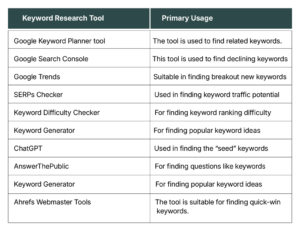Jump to Section
ToggleSearch engine optimization (SEO) relies on keywords as its foundation. But with so many keywords available and the huge impact of AI on SEO, how do you choose the right ones to drive traffic, improve rankings, and grow your business in 2025?
In 2025, keywords will go beyond simple terms. Search engines now prioritize semantic search, meaning they consider the context and intent behind a search rather than just matching exact words. This makes long-tail keywords, question-based searches, and conversational queries more important than ever.
For example, instead of just targeting “best smartphones,” a better approach would be “What are the best smartphones for photography in 2025?” This type of keyword aligns with how users naturally ask questions and interact with search engines today.
This short guide covers everything you need to know about SEO keywords, from the basics to the best practices for implementation.
What Are SEO Keywords?
SEO keywords are the words or phrases people type into search engines when looking for information, products, or services. Content creators and website owners strategically incorporate these keywords to improve their visibility on search engine results pages (SERPs).
In essence, keywords help search engines understand what your content is about. They can increase your website’s relevance and attract the right audience if used correctly.
Why Are Keywords Important for SEO?
Keywords serve as a bridge between what people are searching for and the content you provide. Here’s why they are essential:
1. Increased Visibility
Proper keyword usage helps your content rank higher on search engines, making it easier for users to discover your website.
2. Targeted Traffic
Using relevant keywords ensures that your site attracts visitors who are genuinely interested in what you offer.
3. Competitive Advantage
Staying ahead of keyword trends helps you compete with other businesses in your industry.
4. User Intent Optimization
With Google’s AI-driven algorithms, understanding and optimizing for search intent (informational, navigational, transactional, or commercial) is key to ranking well. Ignoring keyword strategy means missing out on potential customers, lower engagement rates, and reduced search visibility.
For example, if you run a digital marketing agency, strategically using keywords like “SEO agency in London” or “best marketing agency in New York” can attract potential clients searching for those services in those locations. On the other hand, using irrelevant or overly broad keywords may bring in traffic that isn’t interested in your offerings.
Types of SEO Keywords
To optimize content effectively, you need to understand the different types of keywords:
1. Short-Tail Keywords (Head Keywords):
- Broad and highly competitive (e.g., “running shoes”).
- High search volume but lower conversion rates.
2. Long-Tail Keywords:
- More specific and lower competition (e.g., “best running shoes for beginners”).
- Higher conversion rates due to specificity.
3. LSI (Latent Semantic Indexing) Keywords:
- Related terms that help search engines understand content context (e.g., for “digital marketing,” LSI keywords could be “SEO,” “content strategy,” and “online advertising”).
4. Branded Keywords:
- Keywords that include a company’s name (e.g., “Nike running shoes”).
- Important for brand recognition and reputation.
5. Transactional Keywords:
- Indicate strong buying intent (e.g., “buy best noise-canceling headphones 2025”).
- Valuable for e-commerce and service-based businesses.
6. Geo-Targeted Keywords:
- Keywords with location-based intent (e.g., “best coffee shop in New York”).
- Crucial for local SEO.
Understanding Search Volume and Keyword Competition
When selecting keywords, it’s important to consider key SEO metrics. Choosing the right keywords requires a balance between search volume and competition(Keyword Difficulty):
1. Search Volume: This refers to the number of monthly searches a keyword gets. High-volume keywords attract more traffic but are harder to rank for. To maximize impact, focus on a mix of high-volume and niche keywords that align with user intent.
2. Keyword Difficulty: Some keywords are harder to rank for because they are highly competitive. If many well-established websites rank for a keyword, it will be harder for a new site to break into the top results. Using keyword research tools can help identify opportunities where competition is moderate but still valuable.
3. Cost-Per-Click (CPC): If you’re running paid ads, CPC helps determine how expensive a keyword is in digital advertising. A high CPC typically indicates strong commercial intent, meaning businesses are willing to pay more for clicks that can lead to conversions. Understanding CPC can help refine both organic and paid search strategies.
How to Conduct Keyword Research
Effective keyword research is a structured process that involves understanding your audience’s needs and the terms they use to find information. Here’s how to get started:
1. Identify relevant topics. Think about what your target audience searches for and list key topics.
2. Use keyword research tools. Tools like Google Keyword Planner, Ahrefs, SEMrush, and Ubersuggest can help you analyze search volume, competition, and relevance.
3. Prioritize keywords. Focus on keywords that align with your goals—whether driving traffic, increasing conversions, or improving brand awareness.
4. Incorporate keywords naturally. Use them in titles, meta descriptions, headings, and content without overstuffing.
5. Check Competitor Keywords: Identify what keywords high-ranking competitors are using and find gaps you can target.
6. Create Content Around Keywords: Integrate keywords naturally into your headings, subheadings, meta descriptions, and body content without keyword stuffing.
By following these steps, you ensure your SEO strategy is both data-driven and user-focused, setting your content up for long-term success.
Best Practices for Keyword Placement
Well-placed keywords can significantly improve your content’s search visibility without compromising user experience. The key is to integrate keywords naturally while ensuring the content remains engaging and informative.
To optimize content for search engines, keywords should be placed strategically throughout your page. Key areas include:
- Title Tags: Keep them clear and concise, incorporating primary keywords naturally. A well-crafted title tag should be under 60 characters and clearly convey the page’s content.
- Meta Descriptions: Use compelling language with keywords seamlessly integrated. Meta descriptions should provide a brief yet engaging summary of the page while encouraging users to click through. Keep them under 160 characters to ensure they display correctly on search engines.
- Headings (H1, H2, H3): Structure content for readability and SEO by incorporating keywords into headings. Search engines prioritize headings to understand content hierarchy, making them valuable spots for keyword placement.
- First 100 Words: Google places emphasis on early content for indexing. Including keywords in the first paragraph signals to search engines that your content is relevant to user queries
- URL Slug: A clean, keyword-rich URL improves rankings and helps users understand page content at a glance. Avoid unnecessary words and keep the URL concise, using hyphens to separate words.
- Image Alt Text: Optimizing image alt text with relevant keywords helps search engines understand images and improves accessibility for visually impaired users. Descriptive alt text can also improve image search rankings.
Common Keyword Mistakes to Avoid
Even with the best research, improper keyword usage can hurt your rankings. To achieve your SEO goals, avoid these common pitfalls:
- Keyword Stuffing: Overloading content with keywords makes it unreadable and can result in search engine penalties. While using keywords is essential, Google prioritizes user experience, meaning content should flow naturally. A good rule of thumb is to maintain a keyword density of 1-2% and focus on providing valuable, well-structured content.
- Ignoring Search Intent: Using a transactional keyword in an informational blog confuses search engines and reduces relevance. Understanding whether users are looking for information, making a purchase, or seeking navigation guidance is crucial for effective keyword placement. Aligning your content with the right intent improves engagement and boosts rankings.
- Neglecting Long-Tail Keywords: Many businesses focus only on high-volume keywords, ignoring less competitive long-tail keywords that can drive targeted traffic. Long-tail keywords often have higher conversion rates because they match specific user queries. For example, instead of targeting “best smartphones,” a more effective long-tail keyword would be “best budget smartphones under $500 in 2025.
- Not Updating Keywords:Search trends evolve, and failing to update your keyword strategy can cause your content to lose visibility. Regular keyword research helps you stay ahead of competitors and adapt to emerging search patterns. Leverage tools like Google Trends, Ahrefs, and SEMrush to monitor keyword performance and adjust your strategy accordingly.
Top 5 Evolving SEO Keyword Trends in 2025
As search engines evolve, so do the strategies for keyword optimization. In 2025, advancements in AI, changing search behaviors, and the increasing dominance of zero-click searches are reshaping how businesses approach SEO. Here’s a look at the key keyword trends defining search engine optimization this year.
1. AI-Generated Content Is Changing Keyword Strategies
Artificial Intelligence (AI) is now deeply integrated into SEO, enabling businesses to produce content at scale. AI-powered tools can generate keyword-optimized content, analyze search patterns, and refine strategies in real time. However, as AI-generated content becomes more widespread, competition for rankings has intensified.
While Google doesn’t oppose using AI tools in content creation, it penalises their use to ‘game search results.’Google wants businesses to prioritize original, high-quality content that goes beyond keyword stuffing. As such, its algorithms are increasingly sophisticated in detecting content quality, making context and relevance more critical than ever.
2. Search Intent Is More Important Than Exact Keywords
Google and other search engines now prioritize user intent over exact keyword matches. Instead of just targeting high-volume keywords, businesses need to align their content with the reason behind a search query—whether informational, navigational, or transactional.
For example, instead of just optimizing for “best marketing agency,” companies should focus on long-tail, intent-driven keywords like “how to choose the best marketing agency for a small business.” This approach improves visibility for searches that indicate genuine user interest.
3. Zero-Click Searches Are Reshaping Keyword Optimization
Zero-click searches—where users get answers directly from Google without clicking on a website—are more prevalent than ever. Featured snippets, AI-generated summaries, and knowledge panels are now dominating the Google results page.
For businesses, this means that keyword strategies must go beyond traditional rankings. Instead of just aiming for a top spot, content should be optimized for featured snippets, FAQs, and structured data to increase visibility in AI-generated responses and voice search results.
4. AI-Driven SEO Tools Are Enhancing Keyword Research
AI is not just changing how content is produced. It’s also improving keyword research and selection. Advanced AI tools analyze massive datasets to identify low-competition, high-value keywords and predict future search trends.
Businesses can now use AI-driven platforms like Ahrefs and Semrush to optimize their keyword strategy based on real-time search behavior. The focus is shifting from static keyword lists to dynamic, data-driven insights that adapt as search trends change.
5. Google’s E-E-A-T Guidelines Are Influencing Keyword Rankings
Google’s E-E-A-T framework (Experience, Expertise, Authoritativeness, Trustworthiness) has become a core factor in ranking content. This means that keyword strategies must be backed by authoritative, well-researched content.
For SEO in 2025, businesses should:
– Prioritize expert-driven content by featuring credible sources.
– Optimize for brand searches by improving online reputation.
– Use supporting keywords that reinforce expertise in a topic rather than just targeting one primary keyword.
Essential Keyword Research Tools

Final Thoughts
SEO is an ongoing process, not a one-time task. Understanding your audience, speaking their language, and optimizing your content with the right keywords will set your business up for long-term success. As you move forward in content creation, the best tip is to regularly update your keyword strategy to align with search trends and user behavior.
FAQs About SEO Keywords in 2025
What makes a good SEO keyword?
A good SEO keyword is relevant to your audience, has high search potential, and faces low-to-moderate competition.
Do keywords have to be single words?
No. Many effective keywords are multi-word phrases, known as long-tail keywords.
How many backlinks do I need to rank higher?
There’s no fixed number, but high-quality backlinks from reputable sources can improve your rankings.
What are examples of strong keywords?
Strong keywords are highly relevant, have a clear search intent, and face manageable competition.
How much does SEO cost?
SEO costs vary widely, typically ranging from $250 to $10,000 per month, with hourly rates between $100 and $150.
How do you optimize keywords for SEO?
Incorporate keywords strategically in titles, meta descriptions, headings, image alt text, and throughout your content while maintaining readability.
How can I check my SEO ranking?
Use tools like Google Search Console, Ahrefs, and SEMrush to track your keyword rankings and SEO performance.
Authors
-

Yusuf Mutiat Temitope is a result-driven content writer with years of experience in conversion-driven content writing. Mutiat writes on digital marketing to drive business growth, provide insights on trending topics for the audience, and increase customer engagement.
View all posts SEO Content Writer -







